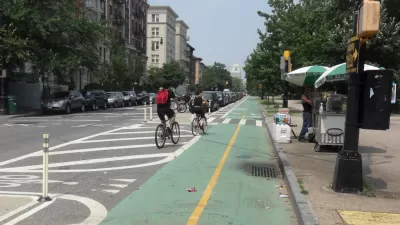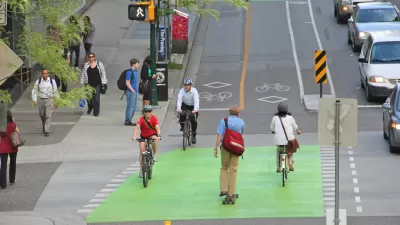Social / Demographics
4 Ways The Government Can Bolster Impact Investing
Impact investing isn't just a new source of funding for nonprofits from the private sector. The government can (and should!) be a catalyst in shaping the market through policies that support investments with a greater social impact.
The Policy Implications of Families in Virginia Choosing to Stay in Cities
Data in Virginia shows that more young families are choosing to stay in urban areas to raise their children. This is causing a rapid increase in school enrollment and fueling the fastest growth Virginia's urban areas have experienced since the 1950s.
Toyota's Move from Torrance to Texas: California's Wake-Up Call?*
Toyota's April 30th announcement that it would take its headquarters from Torrance to Plano, Texas is proof-positive that California's high regulatory, high tax, and high cost of living environment is unfriendly to business. Or is it?

Gentrification as Public Health Risk
Research around the United States has found gentrification to produce public health risks. Will lessons from Oakland and New York City be enough for a rapidly gentrifying city like St. Louis to escape poor public health outcomes?
Tech Bus Opponents in S.F. go to Court to Halt Buses using CEQA
Having lost their CEQA appeal with the San Francisco Board of Supervisors, the "tech bus" opponents are taking their case to the court, arguing that environmental impacts from the large, luxury private buses using public bus stops must be addressed.
Caught Between Rural and Urban: the Migrant Workers Urbanizing China
China's rapid urbanization has been built by a class of citizens called "nongmin," or peasants, many of which have migrated to urban areas for work but retain their legal status as residents of the countryside.

The Wisdom and the Hysteria
Opposition to NYC's bike infrastructure improvements was loud, emotional, and ultimately ineffective. But can planners like Janette Sadik-Khan learn from seemingly unhinged opponents? Planetizen Blogger Josh Stephens decided to ask.

APA Poll Finds Millennials and Boomers 'Investing in Place'
During the American Planning Association's (APA) 2014 National Planning Conference in Atlanta, the APA announced findings from a national opinion survey that shows a clear interest in place-making among the concerns of Americans of all ages.
Honolulu—Nation's Most Expensive Metro Area
Using a metric called "regional price parity," the Commerce Department's Bureau of Economic Analysis shows that urban areas are the most expensive places in the country. Honolulu, Hawaii rates as the most expensive metro area in the country.
Maintaining Social Mobility Amid Salt Lake City's Changing Demographics
A study released in 2013 ranked Sat Lake City fifth in upward mobility, but critics say that the study reflected an earlier era. Now with changing demographics, the Salt Lake is redoubling efforts to maintain opportunities for all of its citizens.
The Texas Miracle: Looking Beyond the Impressive Growth Numbers
Texas is booming—its growth in people and jobs puts it in a league of its own. But another set of growth data pales by comparison: Infrastructure, particularly in the water and transportation needed to accommodate the growth, is woefully lacking.
New Seattle Bus Funding Initiative Addresses City-Suburb Split
It's a pattern seen as recently as two years ago in metro Atlanta: a crucial transit measure wins in the central city but dies in the more populous suburbs. The fix is to craft a city-only transit initiative—just what advocates in Seattle will do.
New AARP Study Finds Older Americans Redefining 'Livable'
"People in the United States are getting older. But increasingly, they don't want to live in some old folks' community," writes Sarah Goodyear. As the number of Americans over 65 grows, concepts like aging in place are gaining new pertinence.

Interdisciplinarity and the Equitable City
On Urban-Think Tank, a design firm working at the intersection of architecture and urbanism to further environmental justice.

Ecocity versus Duplicity
If certain elements of masterplanning are not carefully chosen—and their impacts not carefully explained to final decision makers—then there runs great risk that the cities we design from scratch perform worse than the cities we already have.
How the Sharing Economy Brings Strangers Together
Sharing economy companies encourage personal interactions to improve customer satisfaction and trust among users.
Transportation Considerations for Aging Populations
An article on PlannersWeb details the considerations relevant to the needs of people over 65, who are growing more multi-modal and car-independent every year.

What Millennials Want: A Multi-Modal City
A recent study finds evidence of an overwhelming desire by Millennials to live multi-modal, car-lite lifestyles. They're even prepared to move to find what they want.
'A Plan for a Healthy Los Angeles' Elevates Public Health Among Planning Priorities
Available for public comment until May 13, Los Angeles is considering a new Health and Wellness Element for its General Plan, called “A Plan for a Healthy Los Angeles.” It’s an ambitious document for a large and diverse city.

Which Cities Get to Work Early (or Late)?
According to new analysis by Nate Silver, New York City might be more aptly described as the city that sleeps in.
Pagination
Urban Design for Planners 1: Software Tools
This six-course series explores essential urban design concepts using open source software and equips planners with the tools they need to participate fully in the urban design process.
Planning for Universal Design
Learn the tools for implementing Universal Design in planning regulations.
Gallatin County Department of Planning & Community Development
Heyer Gruel & Associates PA
JM Goldson LLC
City of Camden Redevelopment Agency
City of Astoria
Transportation Research & Education Center (TREC) at Portland State University
Jefferson Parish Government
Camden Redevelopment Agency
City of Claremont


































